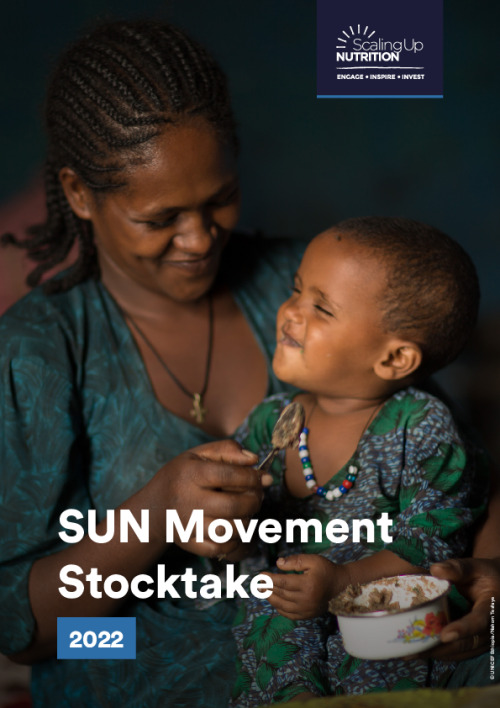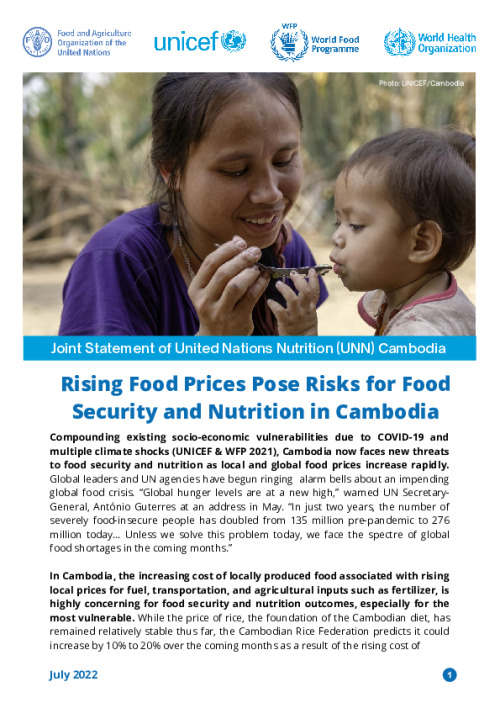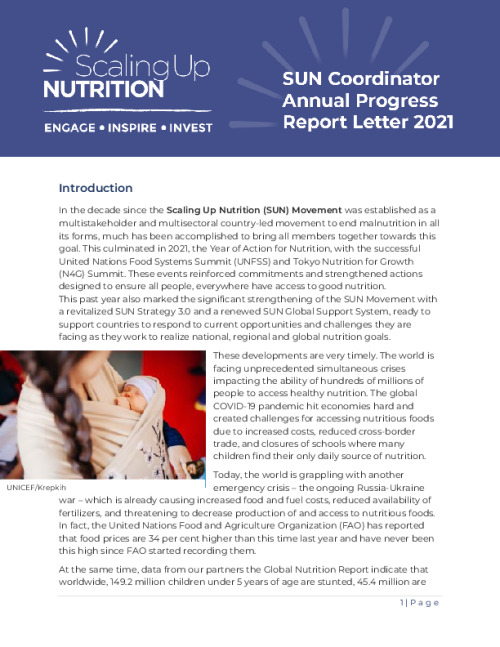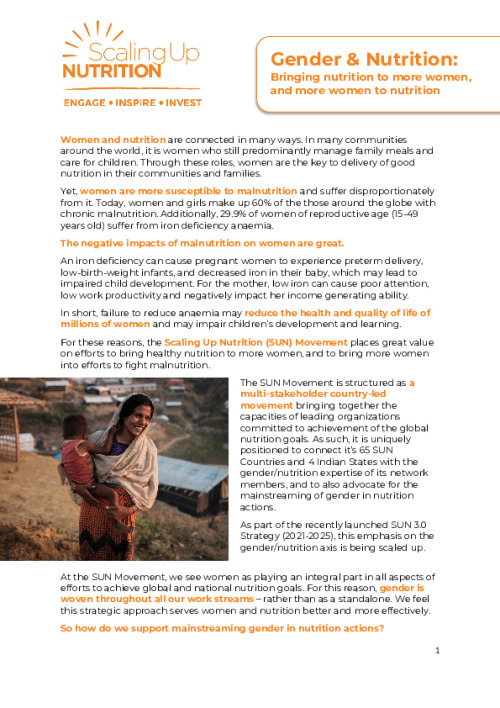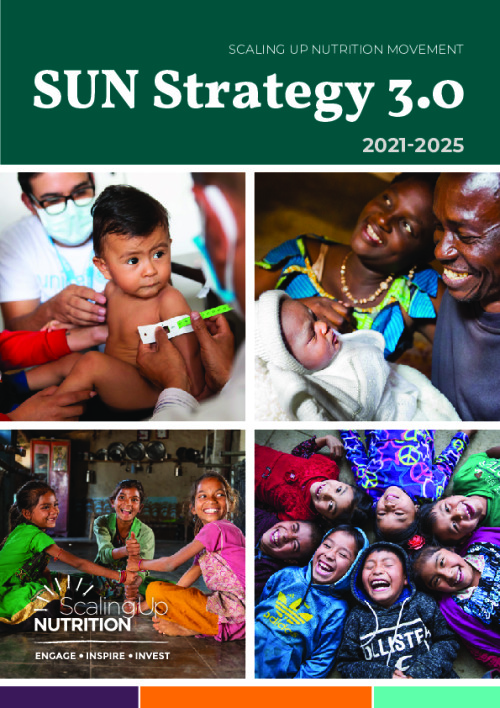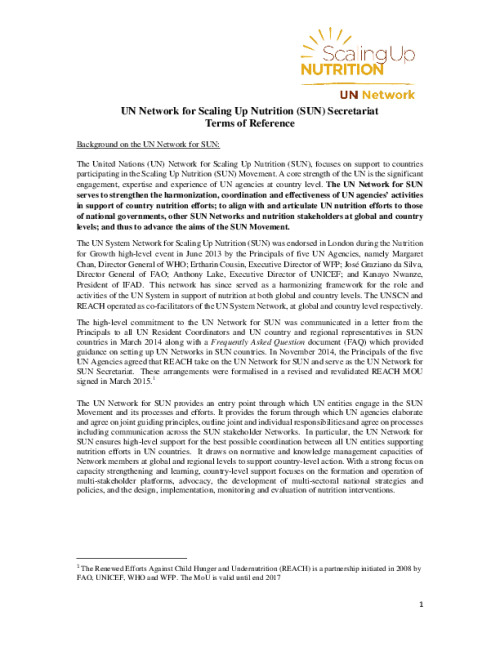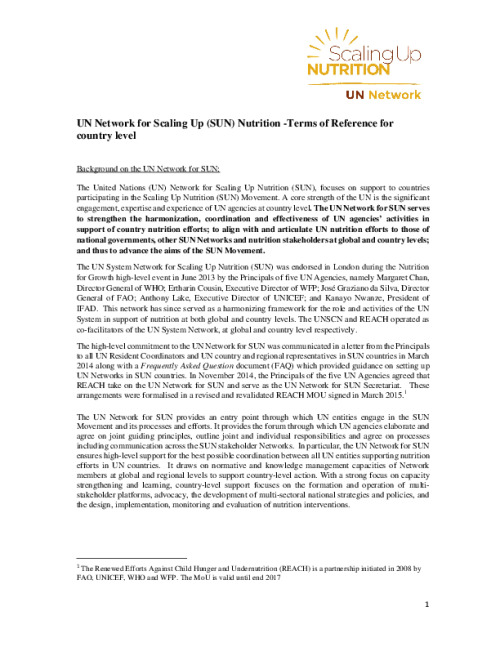UN-Nutrition
Main navigation
UN agencies have played a pivotal role in the Scaling Up Nutrition (SUN) Movement from the outset. They were instrumental in giving rise to the Movement and continue to help anchor its collective force, even hosting the global secretariat based in Geneva, Switzerland. Today, we engage as UN-Nutrition following the merger of the UN Network for SUN and the United Nations System Standing Committee on Nutrition (UNSCN) in 2020.
UN-Nutrition is the inter-agency mechanism that aims to ensure that UN nutrition efforts at global and country level are aligned, connected, mutually supportive and well-coordinated. One important aspect of its work is to serve as the UN support network for the SUN Movement, at all levels. The added value of UN-Nutrition is in the ‘togetherness’ or coherence of work and policies, which enable systemic change.
As outlined in the UN-Nutrition Strategy (2022‒2030), it advocates for high-level political engagement in support of the objectives of the United Nations Decade of Action on Nutrition 2016−2025 and the realization of nutrition commitments pledged through the UN Food Systems Summit (UNFSS) and the Tokyo Nutrition for Growth (N4G) Summit. This, in turn, brings momentum to action towards global targets, such as the six World Health Assembly (WHA) nutrition targets and those regarding diet-related noncommunicable diseases (NCDs).
At a glance
UN country teams support government-led priorities with greater efficiency thanks to more integrated and streamlined efforts within the UN System. The coordination modalities of UN-Nutrition in a country will vary depending on the context. Where possible, senior UN personnel, acting as country convenors or co-convenors, mobilize UN-Nutrition to facilitate coordination and help elevate nutrition to a country’s highest political levels. Technical focal points from the various UN agencies play a key role in advancing governments’ strategic priorities through joint and coherent nutrition work, including technical assistance. This can be complemented by additional support, facilitated by the UN-Nutrition Secretariat, for requests outside the scope of individual agencies in country.
Today, UN-Nutrition has 16 members at the global level, namely: the Food and Agriculture Organization of the United Nations (FAO); the Consortium of International Agricultural Research Centers (CGIAR); the International Atomic Energy Agency (IAEA); the International Fund for Agricultural Development (IFAD); the Office of the United Nations High Commissioner for Human Rights (OHCHR); the Special Rapporteur on the Right to Food; the United Nations Department of Economic and Social Affairs (UN DESA); the United Nations Development Programme (UNDP); the United Nations Environment Programme (UNEP); the United Nations Human Settlements Programme (UN-Habitat); the Office of the United Nations High Commissioner for Refugees (UNHCR); the United Nations Children’s Fund (UNICEF); the United Nations Industrial Development Organization (UNIDO); the United Nations Office for the Coordination of Humanitarian Affairs (UNOCHA); the World Food Programme (WFP); and the World Health Organization (WHO). A small secretariat, hosted by FAO headquarters, facilitates the work of the collective, helping members align positions, share knowledge across institutions and speak with one voice to elevate nutrition on the international agenda and improve collaboration at the country level.
UN-Nutrition is an integral part of the SUN Global Support System (GSS), serving on an array of thematic working groups from communications to monitoring, evaluation and learning. Not only does it harness UN expertise and bring that to those discussions, but it also helps bridge global and country efforts to ensure relevance and technical rigour. This helps strengthen linkages with other complementary fora where UN-Nutrition is actively engaged, such as the Committee on World Food Security (CFS), coalitions arising from the UN Food Systems Summit (e.g. the Coalition of Action for Healthy Diets from Sustainable Food Systems [HDSFS]) and communities of practice, fostering coherence within the wider nutrition ecosystem.
UN-Nutrition is governed by a steering committee, comprised of the nutrition leads of 7 agencies: the Food and Agriculture Organization of the United Nations (FAO); the International Atomic Energy Agency (IAEA); the International Fund for Agricultural Development (IFAD); the United Nations Environment Programme (UNEP); the United Nations Children’s Fund (UNICEF); the World Food Programme (WFP); and the World Health Organization (WHO). Two of these agencies ‒ IAEA and UNEP ‒ are rotational members on the committee, which serve a renewable 2-year term, and thus broaden representation beyond the constituent members (FAO, IFAD, UNICEF, WFP and WHO). The steering committee is led by the UN-Nutrition Chair, a senior leader (of at least Assistant Principal level), elected on a 2-year rotational basis.
Latest progress
- Launch of the first-ever UN-Nutrition Strategy (2022‒2030) , which articulates UN-Nutrition's “working as one” approach
- New guidance note on integrating nutrition into the United Nations Sustainable Development Cooperation Frameworks (UNSDCFs) released, helping to foster increased coherence and reinforce the multisectoral approach to nutrition
- Successful completion of the Nutrition Stakeholder and Action Mapping exercise in five countries (Burkina Faso, Lesotho, Liberia, Senegal and Sierra Leone), culminating in aggregated data on intervention coverage that empowers and equips government authorities to better coordinate nutrition actions across sectors and stakeholders
- Publication of the UN-Nutrition Journal on “Transforming Nutrition” with over 20 peer-reviewed articles about transformative measures that can be taken, with a view to promoting and facilitating action in all countries (including SUN) towards the achievement of global nutrition targets. This publication is one example of UN-Nutrition’s collective work on knowledge management, harnessing the technical expertise of its Member Agencies who serve on its editorial board
- Support of the ‘Year of Nutrition for Africa’ by joining forces through the UN Liaison Team to the African Union
-
Building bridges between the nutrition and environmental communities through awareness-raising about the nutrition-environment nexus and the need for interdisciplinary solutions, including UN-Nutrition’s engagement in numerous events at COP27
